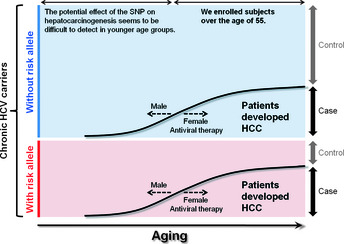Figure 2.

Scheme of our study design considering the age range for developing hepatocellular carcinoma (HCC). All subjects were Japanese patients with chronic hepatitis C virus (HCV) infection, therefore, the controls used in this study were not healthy controls but chronic HCV carriers.65 We enrolled subjects over the age of 55 years because most HCC patients are diagnosed at age 55 or older.23, 66, 67, 68 The potential effect of the SNP on hepatocarcinogenesis seems to be more difficult to detect in younger age groups, although males generally develop HCC at a younger age than females,23, 66, 67 and antiviral therapy may prevent development of HCC.22, 43, 44 SNP, single nucleotide polymorphism.
